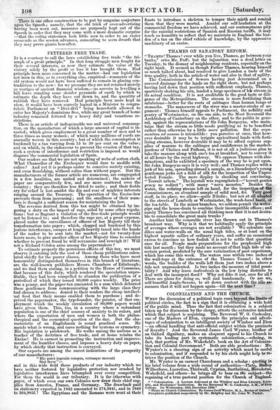FETTERED FREE TRADE.
IT is a courtesy to call the laws establishing free trade "the tri- umph of a great principle." In that long struggle men fought for their several interests, as now they estimate the value of the victory solely by the profit or loss it has brought them. Had principle been more concerned in the matter—had our legislation not been in this, as in everything else, empirical—remnants of the old system would not have been suffered to remain in glaring con- tradiction to the new: for we presume they are not retained merely as vestiges of ancient financial wisdom,—as navvies in levelling a hill leave standing some slender pyramids of earth by which to estimate the depth they have cut down to, and the quantity of rubbish they have removed. Had principle been more kept in view, it would have been scarcely, logical in a Minister to congra- tulate Parliament on " Divi-divi " being henceforth allowed to enter her Majesty's dominions free, while any great branch of home industry remained fettered by a heavy duty and vexatious re- strictions.
There is an article of indispensable use and universal consump- tion, on the manufacture of which a large amount of capital is in- vested; which gives employment to a great number of men and to three times as many women; of which many millions of yards are annually woven in this country; but of which the consumption is btudened by a tax varying from 15 to 30 per cent on the value; and on which, in the endeavour to prevent the evasion of that tax, such a system of interference and restriction is imposed as would disgrace the commercial legislation of Spain. Our readers see that we are not speakmg of webs of cotton cloth. What Chancellor of the Exchequer would dare to meddle with calico ? And yet it is perhaps easier to conceive society existing, and even flourishing, without calico than without paper. But the manufacturers of the former article are numerous, are congregated in a few localities, are united and determined ; the makers of paper are comparatively, few, and are more scattered over the country; they are therefore less fitted to unite ; and their feeble cry for relief is lost amidst the din and roar of mightier interests surging around the Treasury. The operation of the Excise-law prevents them from increasing; and the smallness of their num- bers is thought a sufficient reason for maintaining the law. The revenue derived from this tax might be obtained by im- posing a duty on the import of rags, aided by some other regula- tions: but so flagrant a violation of the free-trade principle would not be listened to ; and therefore the rags are, at a great expense, placed under the surveillance of officers of her Majesty till their transformation into paper ; which, clogged and burdened by this jealous interference, escapes at length heavily taxed into the hands of the maker to be sent into the market—not for twenty-four hours more, to give another officer of her Majesty time to consider whether to prevent fraud he will reexamine and reweigh it! Will not a Richard Cobden arise among the papermakers ?
To estimate properly the pernicious effects of this tax, we must observe it entering into the cost of those cheap publications calcu- lated chiefly for the poorer classes. Among those who have most honourably distinguished themselves in this branch of literature, are the well-known publishers Messrs. Chambers of Edinburgh; and we find them stating, in a petition to the House of Commons, that because of this duty, which rendered the speculation unpro- fitable, they had been compelled to abandon the publication of a periodical of which they issued 80,000 copies weekly.. The price was a penny, and the paper-tax amounted to a sum which debarred these gentlemen from communicating with the large class they had chosen to address; denied to their readers the cheap intellect- ual food that their means enabled them to purchase ; and de- prived the papermaker, the typefounder, the printer, of that em- ployment which the weekly circulation of 80,000 papers would have given them. This, too, in a country where a redundant population is one of the chief sources of anxiety to its rulers, and where the exportation of men and women is both the philan- thropical and the economical question of the day. But the cha- racteristic of an Englishman is sound practical sense. He mends what is wrong, and cares nothing for systems or symmetry. His legislation is patchwork. He walks among the nations as a teacher of the doctrines of free trade, and at home retains the Excise! He is earnest in promoting the instruction and improve- ment of the humbler classes, and imposes a heavy duty on paper, by which chiefly that instruction is conveyed. Our exports are among the surest indications of the prosperity of our manufactures: "Hie patet ingeniis campus, certusque merenti Stet favor "— and in this wide field those products of our industry which we have neither fostered by legislative protection nor crushed by legislative interference have triumphed over every competition. For them the world is our tributary. It is far otherwise with paper, of which even our own Colonies now draw their chief sup- plies from America, France, and Germany. The drawback paid on stationery exported in 1842 amounted to 274,5441., and in 1849 to 264,9&51.! The Egyptians and the Romans were wont at their feasts to introduce a skeleton to temper their mirth and remind them that they were mortal. Amidst our self-laudation at the commercial freedom we have achieved, and our contemptuous pity for the suicidal restrictions of Spanish and Russian tariffs, it may teach us humility to reflect that we maintain in England the bur- den of a tax on the chief vehicle of knowledge, by the oppressive machinery of an excise.


























 Previous page
Previous page